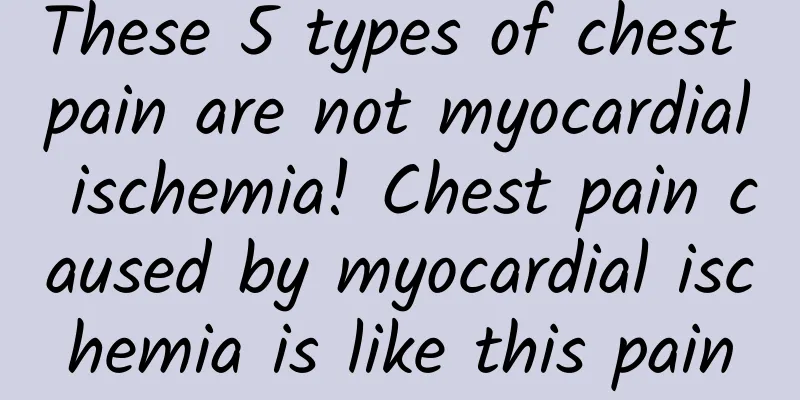These 5 types of chest pain are not myocardial ischemia! Chest pain caused by myocardial ischemia is like this pain

|
ask Why do doctors always say that 90% of myocardial infarctions can be prevented! But in reality, there are still hundreds of thousands of people who die suddenly from myocardial infarction, and millions of people suffer from myocardial infarction every year? answer This is because most people don’t know which discomforts are warning signs of myocardial infarction! In reality, on the contrary, there are some people who are too nervous and suspect any chest pain as myocardial ischemia, angina pectoris, or myocardial infarction, which makes them uneasy and they call 120 from time to time, making their family members panic as well. 1. Preliminary exclusion of chest pain caused by myocardial ischemia 1. Sudden chest pain Some friends often feel sudden chest pain, but the pain lasts for a very short time each time; sometimes it is only a moment, half a second to 1 second, and no more than 2-3 seconds at most. 2. Chest pain on compression Some friends also experience chest pain after pressing. That is, they feel fine when they stay still, but they feel pain after pressing their chest with their hands; or they feel slight pain at ordinary times, but after pressing with their hands, the pain will become more severe and the pain will be fixed and clear. This kind of chest pain is generally not angina pectoris caused by myocardial ischemia. 3 Chest pain caused by breathing I don't have chest pain at ordinary times, but I feel chest pain after I breathe in and out, especially after taking a deep breath, the chest pain will appear or worsen. This kind of chest pain is not myocardial ischemic angina pectoris. 4 Pinpoint chest pain There are also many people who often feel stabbing, needle-sized pain in the chest. 5. Chest pain all day long Some people experience chest pain all day long, for several hours or even more than ten hours. So what are the causes of the above 5 types of chest pain? 2. Chest pain caused by myocardial ischemia has the following characteristics: 1. Time: 2-15 minutes, 3-8 minutes is more common. Every occurrence of myocardial ischemic angina pectoris is a warning of myocardial infarction. Therefore, if you understand what myocardial ischemic angina pectoris is, you can seek medical attention and receive regular treatment in time, thereby preventing most myocardial infarctions. In short, if you have real myocardial ischemic angina pectoris, you must not take it lightly, you must not ignore it, and you must seek medical attention immediately; but if you have false myocardial ischemic angina pectoris, there is no need to be overly nervous and make people panic. |
<<: What is the edible value of the queen flower? What is the medicinal value of the queen flower
>>: Muscle atrophy is a disease, but it is seriously ignored by us——
Recommend
What exercises can tighten the vagina?
The vagina is an important organ of women and the...
What is horseradish that people in Northeast China refer to? What is horseradish made of?
People's lives are inseparable from food, clo...
Why do we eat glutinous rice balls and dumplings during the winter solstice? Who are the people who are suitable and who are not suitable to eat glutinous rice balls?
Tangyuan originated in the Song Dynasty. It was a...
What are the causes of amenorrhea? How can it be treated?
Author: Yu Qi, Chief Physician, Peking Union Medi...
Is masturbation harmful after medical abortion?
Normal people have normal physiological needs, so...
Lactation period is once every half month
Women need to pay special attention to their bodi...
Can I eat peas while breastfeeding?
Lentils are a very common vegetable. Many women w...
What is the cause of hydrosalpinx on the left side?
If there is an abnormality in a woman's fallo...
How to maintain after uterine fibroid surgery
Uterine fibroids are a relatively common gynecolo...
Non-lactation acute mastitis
Non-lactation acute mastitis usually occurs in yo...
What is the reason for heel pain after abortion?
Every woman does not want to go to the hospital f...
Is pelvic inflammatory disease serious?
Pelvic inflammatory disease is a common gynecolog...
Counterpoint: Total shipments in India's mobile phone market in Q1 2023 were 31 million units, down 19% year-on-year
Recently, according to a report released by marke...
Tips for swollen and bleeding gums during pregnancy
During pregnancy, the front teeth will become mor...
What kind of kidney stones can be removed using minimally invasive methods?
Author: Zhang Yi, Chief Physician, Peking Univers...









